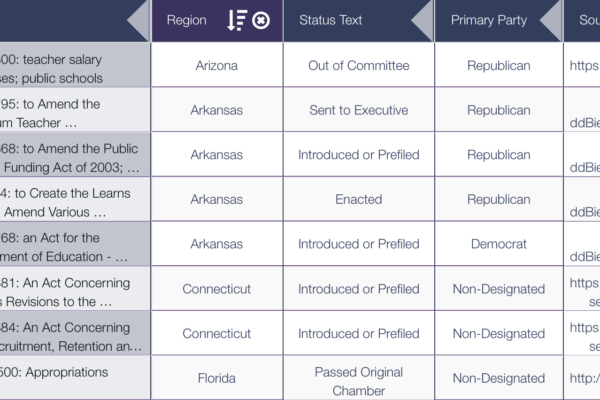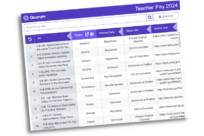With the average public school teacher salary barely budging since the mid-1990s after adjusting for inflation and teacher shortages exacerbated by the pandemic, lawmakers on both sides of the political aisle are introducing bold proposals that would raise compensation significantly.
On the national level, U.S. Rep. Frederica Wilson (D-Fla) introduced the American Teachers Act late last year to raise teacher starting salaries to $60,000 nationally from an average of $42,500. Last month, Sen. Bernie Sanders (I-Vt) filed a similar measure, the Pay Teachers Act, that would guarantee public school teachers annual compensation of at least $60,000, a figure that would increase as their careers progressed.
State officials are also pushing to increase teacher pay, with nearly half of governors pledging in their 2023 state-of-the-state addresses to improve compensation. Some state leaders are raising teacher pay through the budget process. Others are revamping teachers’ pay structure, including establishing minimum salaries and addressing shortages with targeted incentives based on expertise and performance.
In Arkansas and Utah, salary boosts are included in legislation that would allow families to use public funds to pay for private schooling—perhaps to draw broader support for universal private-school choice policies.
FutureEd has identified at least 67 teacher-pay bills that have been introduced or pre-filed by both Republicans and Democrats in 26 states during the 2023 legislative session. So far, 11 bills have been signed into law in nine states, including Arkansas, Idaho, Florida, Maryland, Montana, Oklahoma, Tennessee, Utah and Washington.
Arkansas’ S.B. 294, or the “LEARNS Act,” which was signed into law March 8 by Republican Gov. Sarah Huckabee Sanders, will increase the minimum salary for starting Arkansas teachers to $50,000 a year, up from $36,000. The new law also includes $2,000 raises for more experienced teachers and some incentive bonuses of up to $10,000 for effective teachers. The increased teacher compensation is one component of the larger education package, which also includes state funds for universal education savings accounts that families can use for private school tuition or other education expenses.
Similarly, Utah’s H.B. 215, signed by Republican Gov. Spencer Cox on January 28, will increase teacher salaries while also providing public funding for private-education options for all students in the state. Teacher salaries will rise by $4,200 annually and other benefits by $1,800, and teachers will be eligible each year for the same $6,000 total compensation increase. Utah’s S.B.183, signed by Governor Cox on March 17, ensures that the $6,000 increase will be adjusted annually to keep up with inflation.
Advocates for these bills argue that increasing the minimum starting salary would draw candidates to the teaching profession, though some question whether the focus on starting salaries and the relatively small increases in veteran teacher compensation would increase attrition among experienced teachers. Others question combining teacher-compensation provisions with language enabling the use of public resources to fund private schooling.
Some of the new legislation would increase base salaries for all teachers, regardless of experience. Arizona’s H.B. 2800 would raise salaries by $10,000 over the next two years, though administrators and teachers who receive a poor performance evaluation would not be eligible for the increases.
Under Maine’s L.D. 1064, teachers would see a gradual increase toward a minimum starting salary of $50,000 by the 2027-28 school year. Connecticut’s H.B. 6884 would establish a minimum salary of four times the federal poverty level for an individual ($58,320 in 2023). And companion bills introduced in Florida, S.B. 342 and H.B. 271, the “Save Our Teachers Act,” would increase minimum starting salaries from $48,000 to $65,000.
Some bills go beyond teacher salaries to address compensation for other school employees.
Massachusetts’ H.D. 4224 would increase starting salaries for teachers to $65,000 and teacher aides to $40,000. The legislation would have the state cover the initial cost of the salary increase and then phase out the state’s financial responsibility over several years. Other states have taken the same approach.
Democratic lawmakers in Texas introduced companion bills H.B. 1548 and S.B. 693 that would give teachers a $15,000 pay raise in the next school year and other school employees a 25 percent raise, effectively placing minimum pay for starting teachers at $46,660 and raising average teacher pay to $73,887. Another bill, S.B. 9, introduced by Republican lawmakers, takes a more modest approach, providing $2,000 raises across the board and $4,000 raises for teachers making below the state’s salary median.
In Missouri, Democratic-sponsored bill S.B. 19 would raise teacher starting salaries from a strikingly low $25,000 a year to at least $38,000, with higher salaries for those with advanced degrees and more experience. Republican-sponsored bill H.B. 433 would also raise the starting salary to $38,000 for the next school year, with the goal of reaching $48,000 by the 2028-29 school year.
Republicans in the state have also introduced legislation that would allow for differentiated pay for hard-to-staff schools or positions (H.B. 497 and H.B. 190), while another Democratic-sponsored bill, H.B. 415, would provide supplemental funding to school districts where salaries are below the statewide average or those experiencing shortages.
Oklahoma legislators from both parties have also introduced a host of legislation that would raise compensation, ranging from $2,000 every three years for the next nine years (S.B. 28) to $5,000 in the next year (S.B. 903). Oklahoma’s S.B. 482 would provide larger increases for more experienced teachers: $3,000 for entry level teachers; $4,000 for teachers with at least 5 years of experience; $5,000 for teachers with at least 10 years; and a $6,000 boost for teachers with 15 or more years. S.B. 466 would raise compensation for special education teachers to 10 percent higher than that for other teachers, an example of a growing commitment among both Democrats and Republicans to paying teachers for their expertise rather than simply for their academic credentials and years of experience.
The spreadsheet below will automatically update to reflect the status of these and other teacher-compensation bills as they move through the legislative process. New bills will also be added as they are introduced.


